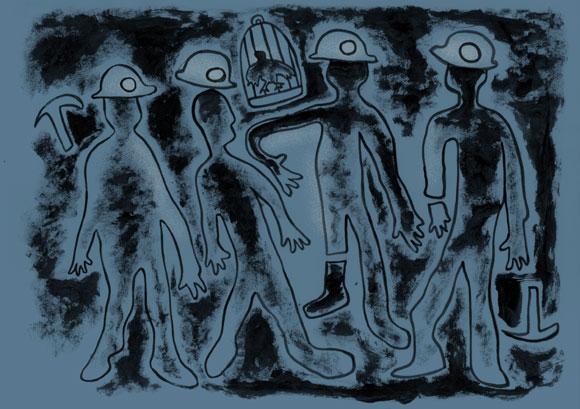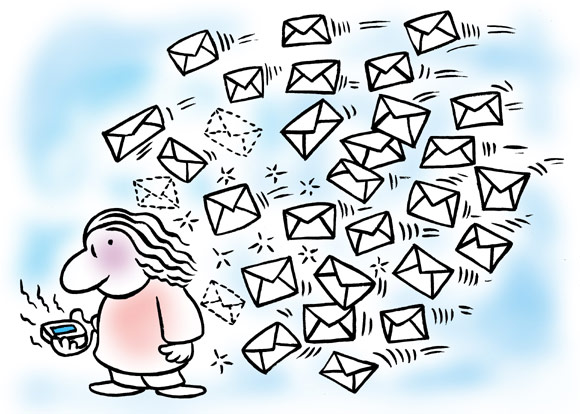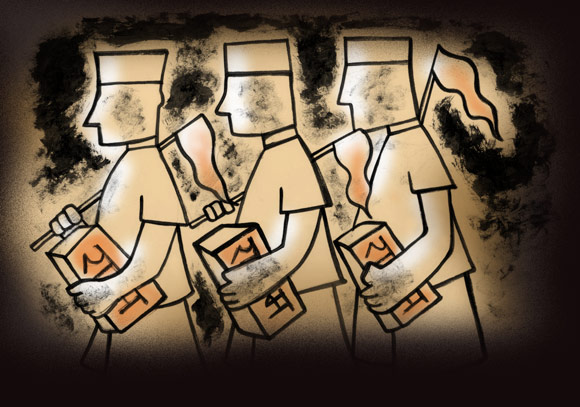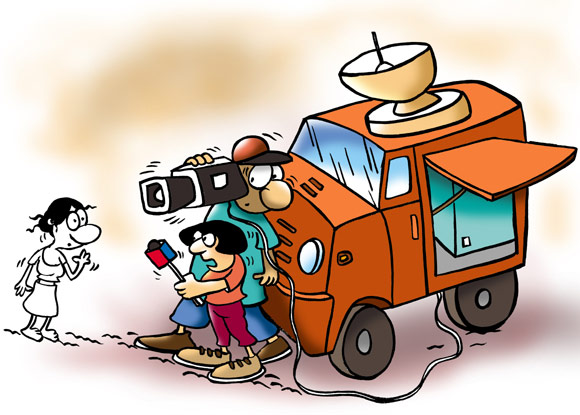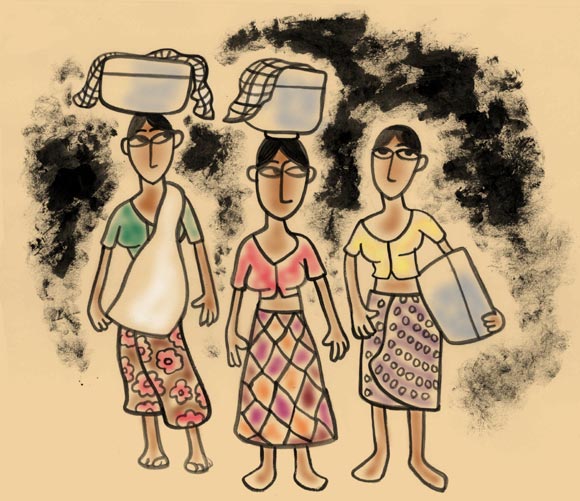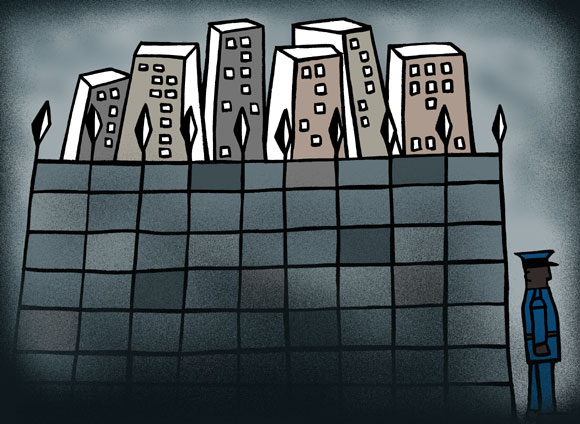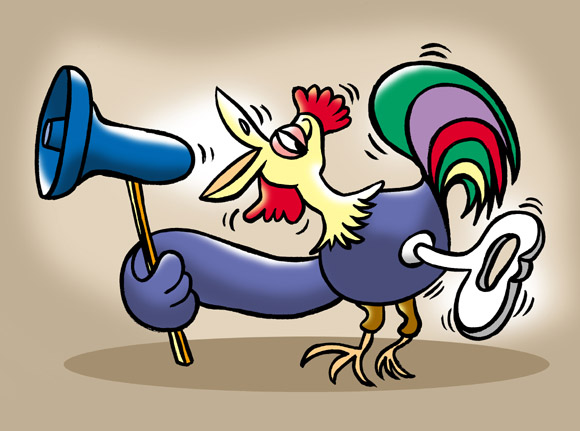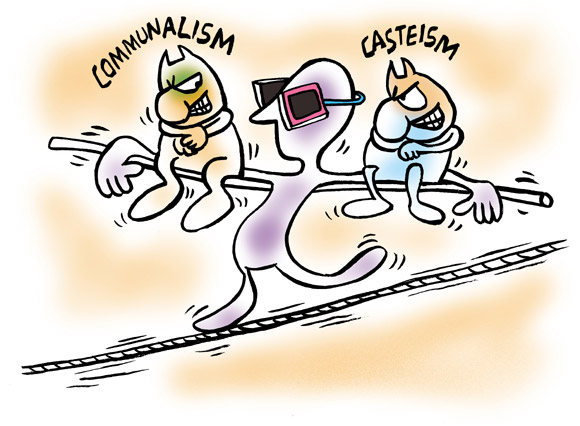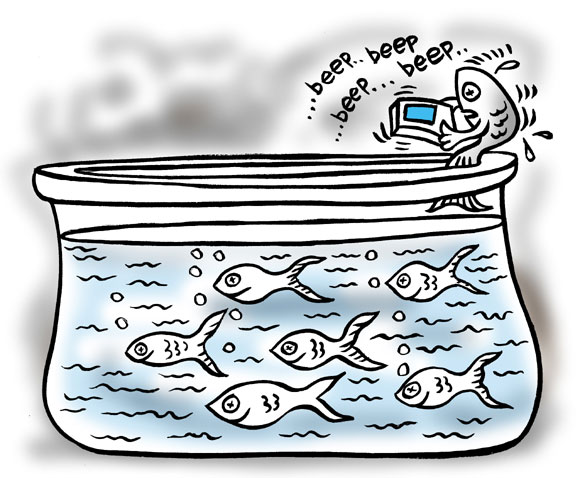 | « Back to article | Print this article |
'The Indian media has been a spectacular failure'
Eighty per cent of Indians earn less than Rs 10,000, and the more you talk to this segment, the more you realise what a spectacular failure the Indian media has been in understanding, reflecting and empathising with this 'other India,' says award-winning journalist, Rediff.com's Sheela Bhatt.
Illustration: Uttam Ghosh
I was with the print media in Delhi, with the Gujarati edition of India Today, when I received the Chameli Devi Jain Award in 1993.
But my world of yesterday seems a distant past. Before life became 'modern', I reported India differently.
Let me begin by relating the background to my story so that I can adequately convey the sense of loss within me.
I became a journalist in 1979, at a time when I did not know English. All I had was a burning desire to communicate.
Call it naivete or plain idiocy, but I blithely overlooked the fact that my window to the world was primarily through a badly produced Gujarati daily published in Mumbai.
Yet, the reporting of the disaster in the Chasnala coal mine in 1975 moved me intellectually and emotionally to become a journalist. Three hundred and seventy-five miners died due to the flooding of the mine. Those images have haunted me ever since.
Sheela Bhatt, who began reporting at the age of 19, writes mainly on the marginalised sections of Indian society on Rediff.com and India Abroad where she is currently Senior Editorial Director, News.
She founded, edited and published the anti-establishment Gujarati weekly, Abhiyaan.
She also conceived and launched India Today's Gujarati edition, working as its senior editor for four years.
Later, as editor, Star TV, she supervised the content of Star News and produced several well-received weekly programmes.
Sheela Bhatt received the Chameli Devi Jain Award in 1993. She shared the award with Manimala and Alka Raghuvanshi.
Please click Next to read further...
'My life is driven by a tsunami of information'
In 2000, I switched to online journalism and it is from this perspective that I offer some thoughts.
My life is now driven by a tsunami of information and opinions that pour in 24x7 through digital technology.
Initially, it was a completely new experience to work through 'mailboxes'. Then I got used to it. Now, in my Gmail window, Jairam Ramesh is visible, Ahmed Patel is on BBM, Sushma Swaraj tweets warmly, Arun Jaitley is just an e-mail away and the people at the PMO reply instantly through SMS.
Yet, this is a false, technology-mediated sense of 'connectivity'.
When I tiptoed into the world of journalism, I could carry with me all the documents, reports or other materials I needed, nicely packed in just two bags.
>But, although I did not possess the many mailboxes I now do, and I lacked the means to 'connect' with political leaders in the real or cyber world, I was connected with what I consider the 'real India' round the clock.
Without intermediaries like e-mail or Facebook, I walked and walked for hundreds of miles to meet people. I did not select them -- like I do now. I was with them, all the time, on the streets, in the bazaars, in the courtrooms, in hospitals and police stations, and in the villages, whereas, now I find myself 'sms-ing' news all the time with two tired thumbs, through my mobile phone.
Please click Next to read further
'Tweets can never take the place of human contact'
The struggle today is about keeping the balance between the input that comes through technology and real-world interactions.
In the past 10 years, an epochal change has occurred in the life and work-style of a reporter. The change is quintessentially about coming to terms with secondary sources of information.
Mailboxes and tweets bring me second¬hand information, which can never take the place of human contact. Nor can they transmit the pulsations of blood and heart or the human factor underlying all developments.
I know I am missing out on the real world. I seem to have capitulated to technology and moved further and further away from classical journalism, which depended upon live contact with people. I regret that loss.
I first began visiting police stations in 1979, asking why they were not handling law and order effectively; in 1985, I began to visit the income tax department to report on issues of black money among Gujarati and Marwari traders; in 1990 I reported on the saffron brigade's mass movement to send Ramshilas to build the temple at Ayodhya.
Those were times when all 24 hours of my day were spent in the real world 'truth-digging', or in search of answers, or in the sheer attempt to touch and comprehend life in the raw.
Please click Next to read further...
'The search for truth has an emotional context that technology cannot give'
It is an altogether different way of life today.
Time has become a constraint because I am engaged with the world through technology! This change is detrimental to my profession and me, and I keep wondering if an information overload is making me richer, emotionally or spiritually.
I think not. I do have more information available now, but I was much better informed then.
I am not against this explosion in the cyber world. But I am intensely aware that, regardless of the available multimedia, or perhaps because of it, the values and fundamentals of journalism should not be diluted, however boring and unfashionable this may sound.
It is clear now that the camera can manipulate; tweets or SMSes, by their very nature, cannot give any reference to the larger context or to the depth of the issue they deal with, and the knowledge and information in mailboxes is never enough to truly report an event.
The search for truth has an emotional context that technology cannot give.
Technology gives a second-hand, mediated, manipulated version of life. This becomes the predicament for every journalist and each one finds his or her own way of making peace with it.
This is the endeavour I find most challenging. It is more so in a poor country like India where digital inequality can prove to be nothing less than a disaster for any reporter.
Please click Next to read further...
'Are we making any real difference to core issues?'
To understand the rural and silently suffering India, you have to de-glamourise journalism from the glitz of technology.
The cyber world is not the only virtual world we journalists inhabit.
The world of television cameras and studio lights is another kind of virtual bubble. I find it absolutely baffling when I hear that the electronic media is very 'powerful', particularly the 24x7 news channels.
This is one illusion that must be demystified. Many of our editors and anchors are millionaires and enjoy celebrity status befitting rock stars. Many television journalists are considered more powerful than bureaucrats.
So what? Does it really matter? How does it make any difference to the Indian who is either not on television or lacks access to it? Is this media hype justified? Are we making any real difference to core issues?
The arrogance of some reporters and editors stumps me. A false sense of 'power' seems to drive many media organisations. The media, like politicians, are living in an ivory tower.
Please click Next to read further...
'Their India is not reflected in the media we know in New Delhi'
I am writing this piece in Kottakkal, tucked away in Malabar (Kerala).
I have met some 30 women representing local organisations. Not one of them in this most literate state in India knows English. So, we in the media, who deal only with English-speaking audiences, are never going to be of any relevance to them -- and the chilling reality is that there are millions of such women in our country.
The high probability is that they form a majority in our country. How this simple and well-known fact gets forgotten so easily in New Delhi baffles me.
Put simply, the journalists writing in English touch only a minuscule minority. But their perceived sense of 'power' remains intact.
The women I met earn between Rs 5,000 to Rs 7,000 per month.
The only celebrities they know are film actors Mohanlal and Mammootty.
Their life is untouched by television, radio or newspapers.
What matters for them is the cost of food, children's education and the price of gold, family harmony and their husbands' chronic alcoholism.
Their India is not reflected in the media we know in New Delhi.
Please click Next to read further...
'How does it contribute to making India a safer, functioning and stronger country?'
Last year, I attended the Kumbh Mela in Haridwar. I interacted with scores of people at leisure. Not one had a clue about the so-called mainstream media.
As soon as I step out of my urban comfort zone, I know that the media is not a priority in life, or in most cases, not even a part of life.
Many studies suggest that 80 per cent of Indians earn less than Rs 10,000, and the more you talk to this segment, the more you realise what a spectacular failure the Indian media has been in understanding, reflecting and empathising with this 'other India'.
Even for our urban people, what difference does the media make in terms of painting the 'big picture' of India? How does it contribute to making India a safer, functioning and stronger country?
The popular and political perceptions of India's national security are such that New Delhi has now emerged as the biggest buyer of weapons in the world to confront assumed threats from China and Pakistan. All this is happening at the cost of development.
Well-settled Indians in cities now live in gated communities guarded by security personnel. Multi-storied luxury apartments stand next to slums in Mumbai. The disparity in standards raises many questions.
The Associated Chambers of Commerce and Industry of India reported in 2010, that India had more than five million watchmen in the private security industry, which has a turnover of more than $4.5 billion. Indifference to the surrounding problems enables us to live happily.
Law and order is one of the most serious issues Indians face on a daily basis. G K Pillai, former home secretary, spoke to Rediff.com before he retired, of the communication revolution taking place, with 600 million mobile phones that provide instant information to the ordinary citizen.
Match this with the rising aspirations of the youth and the forecast can only be 'turbulence' for the coming two decades. No one is willing to wait and there will be pressure to make a quick buck.
Please click Next to read further...
'Corporate influence on the media is evident'
Where do the media figure in this turbulent transformation of Indian society? The plain truth is: Nowhere.
Making loud noises is not journalism. There are over three million cases pending in India's 21 courts and 26.3 million cases in the lower courts and a quarter of a million undertrials in jails. Do we care?
Even our worldview is getting skewed as most English-language newspapers have tie-ups with Western media sources. They reprint the Western perspective on world events. Still we say that the Indian media is 'influential'!
Take the issue of dynastic politics or the maladies of Indian democracy. The Indian media has not been effective in generating public opinion against them. In fact, it has shamefully indulged in 'paid news'.
Many controversial members of Parliament are columnists and television panelists.
Corporate influence on the media is evident. On an average, newspapers give half a page of news coverage to parliamentary proceedings. In the name of reader interest much is omitted, while cricket, cinema and entertainment get prime attention.
Please click Next to read further...
'Lip service is given to providing 'balanced news'
Nothing endangers the survival of our country as much as the communal divide. Secularism is not the natural instinct of the media because the media also needs to cater to the so-called popular taste.
Lip service is given to providing 'balanced news'.
Casteism and communalism have followed us into the twenty-first century, with the media also becoming part of the action.
Take Kerala, which used to be one of the finest examples of communal harmony. It is changing slowly and becoming like much of the rest of India. In neighbouring Karnataka, the virus of communalism is spreading even faster.
Again, despite the reach of 'secular' English television channels in Gujarat, their coverage has failed to counter Narendra Modi's arguments.
In spite of the media's expose of Mayawati's corruption, she marches ahead. Her rise was not due to the media and the media will not be the reason for her downfall, either.
The Amitabh Bachchan legend was made without the media's help. More TRPs or circulation are meaningless for an India that is still waiting for a mirror that reflects its real image.
Please click Next to read further...
'No technology can substitute integrity and authenticity'
After more than a decade into the 'new media', I believe that it is people who are at the heart of good journalism, and no technology can offer a good enough substitute for the integrity and authenticity of live contact with them.
The 'new media' can perhaps be a starting point of journalism with integrity -- but cannot make the latter its captive.
There is a whole world that lies beyond it, which forms the raw material for a good journalist. And there is only one way to establish connectivity with that world -- just walk into it.
Do not let technology be the arbiter.
In fact, you do not need middlemen.
Excerpted from Making News, Breaking News, Her Own Way, Edited by Latika Padgaonkar & Shubha Singh, Stories by Winners of the Chameli Devi Jain Award for Outstanding Women Mediapersons, Tranquebar, 2012, Rs 250, with the author's permission.
